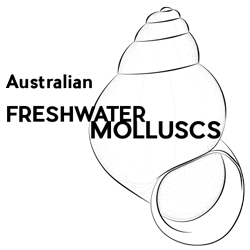
This species belongs to the Austropyrgus rectus group, with members characterised by small to-medium sized, narrow to broad shells, with spires of average length to very elongate, a straight outline, and typically flattened to slightly convex whorls. The coiled oviduct has one or more bends, loops or twists.
Austropyrgus goliathus differs from the other members of this group in the following combination of characters: shell of medium size (up to 4.7 mm), broad, with flattened whorls, last whorl and base sub-angled; basal projection of lateral teeth U-shaped, ovary simple, rectum indenting albumen gland.
Austropyrgus goliathus Clark, Miller & Ponder, 2003
Class Gastropoda
Infraclass Caenogastropoda
Order Littorinida
Suborder Rissoidina
Superfamily Truncatelloidea
Family Tateidae
Genus Austropyrgus Cotton, 1942
Original name: Austropyrgus goliathus Clark, Miller & Ponder, 2003. In Clark, S. A., Miller, A. C. & Ponder, W. F. (2003). Revision of the snail genus Austropyrgus (Gastropoda: Hydrobiidae): A morphostatic radiation of freshwater gastropods in southeastern Australia. Records of the Australian Museum Supplement 28: 1–109.
Type locality: . Spring Creek, northeast of Curdies Inlet, Victoria.
In streams on water weeds, hard substrata (rocks etc.) and crawling on litter and sediment. Can be locally abundant. Assumed to feed by scraping bacteria and microalgae. Lay solitary capsules containing a single egg. Direct development.
This species is found in the small coastal streams and rivers of central western Victoria and King Island, Bass Strait (fide KI. Richards).
Most species of Austropyrgus are geographically isolated and have restricted ranges, and this one is no exception. This species is the largest member of the genus, and the second largest of all known Australian tateids (the largest is Phrantela richardsoni).
Clark, S. A., Miller, A. C. & Ponder, W. F. (2003). Revision of the snail genus Austropyrgus (Gastropoda: Hydrobiidae): a morphostatic radiation of freshwater gastropods in southeastern Australia. Records of the Australian Museum 28: 1–109.